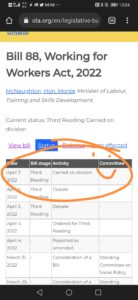Okay, so here’s an update on Bill 88, the one that will help Ontario gig workers. For those in other jurisdictions, I highly recommend you contact your local representatives about having similar legislation created (“right sized” for your area’s needs.)
I was invited to meet with a few “policy people”, those who are helping to write the details/rules the legislation will follow. The scheduled 30-minute session turned in to nearly an hour and was focused on points #1 and #3 (a lot on #3). I stressed the importance of having distance reimbursement start from the location where the batch was accepted as to include travel distance to the store. In addition, setting a “floor” reimbursement tied to the Federal Government per kilometre travel allowance ($0.59/km for 2021 and $0.61/km for 2022).
I told them how important it was for Shoppers to know how their pay is calculated (more than just Batch Pay, Tip and Travel Reimbursement). Gave CornerShop as an example for their clarity on pay. I also made it clear how Shoppers need to know the elements that make up the “batch offer” algorithm (who sees what batches and when). There’s more than just the 5* rating system impacting Shopper batches. We know there are MANY factors, but Instacart is just not telling us!
As I side note, I did mention how as Shoppers we have no means of judging Customers unlike Uber where both Drivers and Passengers have ratings. Shoppers are penalized for cancelling batches even if the Customer is rude. A simple Customer rating system would also help Shoppers when deciding to fulfil an order. A system like that would also go a long way in reducing tip baiters, but that would be more for Instacart to implement as the legislation wasn’t meant to directly address the issue. Unfortunately, Instacart isn’t interested in publishing their (or a modified) Customer rating system (side-side note, yes, Instacart has such a system, as they need to have metrics to decide when to cut a customer loose).
There was more to the conversation, but those were the highlights.
Bill 88 passed the second reading on March 23rd and was then referred to the Standing Committee on Social Policy. If you’re curious about how laws are made in Ontario (and don’t mind a riff on “I’m just a Bill” by School House Rocks) you can watch this:
As a quick reminder, here’s what the bill will covered if passed:
- Earning at least the minimum wage for time worked;
- The right to keep tips;
- The right to information and clarity around algorithms including: how pay is calculated; and how and why a worker might be penalized in the allocation of work;
- Two week’s notice if they are being removed from the platform and why;
- The right to resolve their work-related disputes in Ontario;
- Protection from reprisal should they seek to assert their rights.
Here’s a simple example of how $15 minimum wage would be applied. To be clear, you’re not going to be paid $15 an hour. It’s a benchmark comparison. IC would be responsible for any “earnings gap” on the batch if your effective earnings/hr was less than $15/hr. The time would be based on “engaged time” which is to be determined. Likely from the time a batch was accepted until the last customer is delivered (from that particular batch).
Example:
- $7 batch
- Distance is 2.5km, so the reimbursement is $1 ($0.40 * 2.5)
- Tips aren’t included, so I won’t mention them!
- Engaged Time (still to be defined) for this example will be from the time you swipe until the entire batch has been delivered to the last customer.
IC will be paying you $6 in the above example.
If the Engaged Time was only 20 minutes, your calculated hourly rate would be $18/hr, so you’d not get any earnings top-up.
If the Engaged Time was 60 minutes, your calculated hourly rate would have been $6/hr. IC would have to top up your earnings by $9, making your Hourly Rate effectively $15/hr



